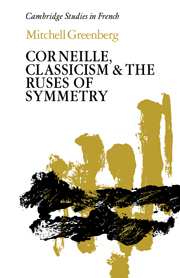Book contents
- Frontmatter
- Contents
- General editor's preface
- Preface
- Introduction
- 1 Mythifying matrix: Corneille's Médée and the birth of tragedy
- 2 Le Cid: Father/Time
- 3 Horace, Classicism and female trouble
- 4 Cinna: empty mirrors
- 5 Polyeucte: seeing is believing
- 6 Nicomède, Rodogune, Suréna: monsters, melancholy and the end of the ancien régime
- Notes
- Index
2 - Le Cid: Father/Time
Published online by Cambridge University Press: 25 October 2011
- Frontmatter
- Contents
- General editor's preface
- Preface
- Introduction
- 1 Mythifying matrix: Corneille's Médée and the birth of tragedy
- 2 Le Cid: Father/Time
- 3 Horace, Classicism and female trouble
- 4 Cinna: empty mirrors
- 5 Polyeucte: seeing is believing
- 6 Nicomède, Rodogune, Suréna: monsters, melancholy and the end of the ancien régime
- Notes
- Index
Summary
‘Que de maux et de pleurs/Nous couteront nos pères.’
Despite its all-consuming violence Médée did not evoke a loud public outcry. Perhaps it was just another in a long line of blood-and-gore tragedies that dominated the Parisian stage in the 1620s and 1630s. Perhaps the public of the day, so accustomed to the constant portrayal of destruction, was too blase to react to Médée's passion. As we know, such was not the case with Le Cid. The ensuing uproar, the ‘querelle’, embraced the play, its characters and the author in a scandal unprecedented in the annals of the French stage. The public's reaction to the Cid was unique in its vehemence, its passion and its division. No other theatrical debut, not even Hernani's ushering in the Romantic revolution, was to have such a momentous impact on its contemporaries and on successive generations of admirers as Corneille's new tragi-comedy. From its premiere to this day, Le Cid is marked as ‘une pièce a scandale’.
For the last three centuries the history of this scandal and its political, esthetic, philosophical and sociological implications have been exhaustively examined. It is not my intention here to go over that well-mapped terrain. What I would like to underline, however, is that once the storm of protest, the accusations and counter-accusations, subsided, once the Académie had made public its own thoughts on the new play, the crux of the scandal remained as troubling as ever. Implicated in this crux were two distinct but interrelated areas of theatrical tension.
- Type
- Chapter
- Information
- Corneille, Classicism and the Ruses of Symmetry , pp. 37 - 65Publisher: Cambridge University PressPrint publication year: 1986

